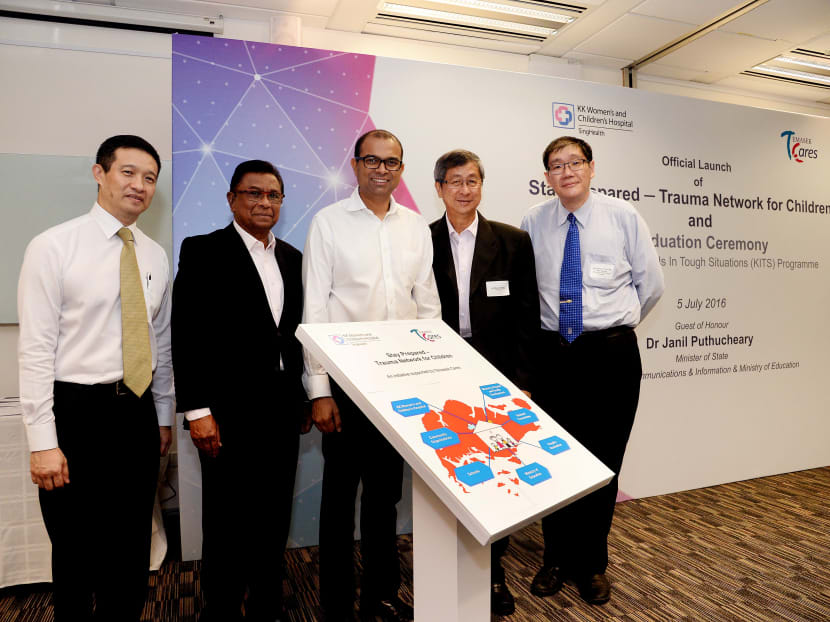New S$3.5 million support network for child trauma cases
SINGAPORE — At home, they may endure harsh physical punishment and abuse or witness domestic violence, while elsewhere, they may have been involved in major accidents or disasters.

(L-R) Professor Kenneth Kwek, Chief Executive Officer, KK Women’s and Children’s Hospital; Adjunct Professor Richard Magnus, Chairman, Temasek Cares; Dr Janil Puthucheary, Minister of State, Ministry of Communications and Information and Ministry of Education; Mr Lim Boon Heng, Chairman, Temasek Holdings and Associate Professor Ng Kee Chong, Chairman, Division of Medicine, KK Women’s and Children’s Hospital at the symbolic launch of Stay Prepared – Trauma Network for Children. Photo: KKH
SINGAPORE — At home, they may endure harsh physical punishment and abuse or witness domestic violence, while elsewhere, they may have been involved in major accidents or disasters.
And it is these child trauma cases that the KK Women’s and Children’s Hospital (KKH), together with Temasek Cares, aim to better support with an expanded initiative.
Building on a programme that was launched in 2014, which sought to train social workers, therapists and school counsellors in providing children with trauma-focused therapy, the new Stay Prepared–Trauma Network for Children, with S$3.5 million in funding, aims to rope in community leaders, volunteers and even seniors.
The goal is to reach out to 3,040 children and their families over the next few years.
Speaking to the media at the launch of the programme on Tuesday (July 5), chairman of Temasek Cares Richard Magnus described the trauma network as a “preparatory” approach that allows for early intervention.
“Whenever you have a crisis, kids are the most vulnerable ... And the trauma is manifested in many ways, not only during the period when they suffer the trauma, but later on it becomes embedded in their own psyche, and develops in other dysfunctional personalities. So we’ve got to catch them at the root when it happens,” said Mr Magnus.
The earlier programme, called Temasek Cares KITS (Kids in Tough Situations), has trained 67 therapists from 30 schools and 14 Family Service Centres in trauma-focused cognitive-behavioural therapy (TF-CBT). It has also helped more than 940 children and their families.
Under the new trauma network, an additional 100 therapists will be trained in TF-CBT. Training in trauma first-aid will also be provided to a wider net of 680 therapists as well as community leaders, seniors and volunteers.
Of these, 16 will also be identified as trainers, who can in turn train and develop trauma first-aid expertise in the community.
Asked about the scale of child trauma in Singapore, Ms Lim Xin Yi, senior principal psychologist and head of psychosocial trauma support service at KKH, said there is no central registry for such cases.
But KKH’s Psychosocial Trauma Support Service (PTSS) sees about 250 to 300 children below 18 years old every year for medical trauma, accidental injuries, and non-accidental injuries.
According to KKH, among the trauma cases seen by school counsellors and therapists under the Temasek Cares KITS programme, 25 per cent involved children who witnessed domestic violence, 26 per cent were children who suffered harsh physical punishment or abuse, and 17 per cent had experienced bullying, sudden loss of loved ones and other issues.
Under the programme, children exposed to trauma would first be taught how to deal with their emotions, and basic coping skills such as re-connecting with their social network and relaxation techniques.
After a month, therapists will assess if the child is coping well or requires more intensive TF-CBT therapy. This would involve more coping techniques, and helping the children make sense of the impact of the trauma, before integrating them back into their daily routine.
On how this process differs from the existing counselling services, Ms Lim noted current counselling support may not be trauma-focused and their work in supportive therapy or art therapy, for example, may not be as effective.
“We’ve done some research on the efficacy of TF-CBT in our local context and it has been shown to have significant improvements in the child’s post-traumatic stress difficulties, anxiety, depression, depressive symptoms as well as the child’s own emotional behavioural difficulties,” she added.
Greendale Primary School’s senior school counsellor Lim Huan Hee, a therapist trained in TF-CBT, said the training has honed his skills in trauma-specific techniques such as trauma narratives, where children process and re-write the script of what they have gone through.
A more structured therapy programme where, for example, children are assessed before, midway through and after therapy also shows the progress of the child, and encourages parents to continue with therapy.
“It gives the whole therapy more credibility, and parents are looking forward to their child’s progress,” Mr Lim added.






